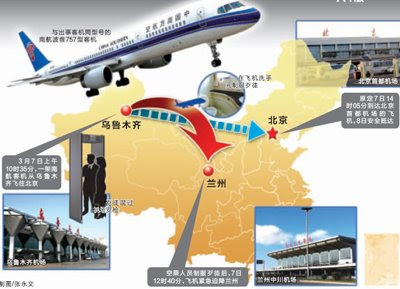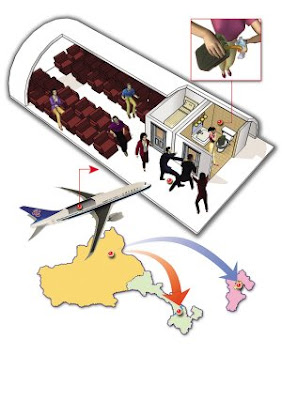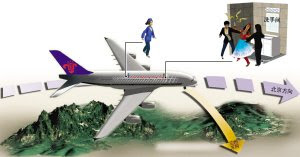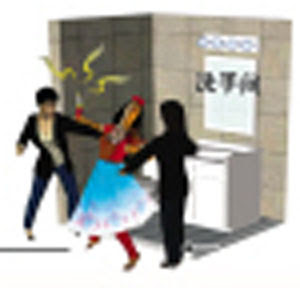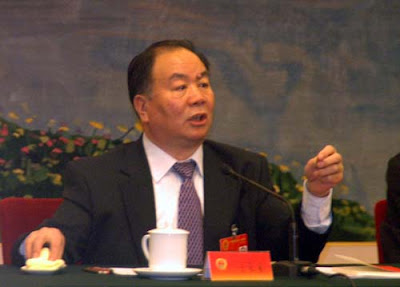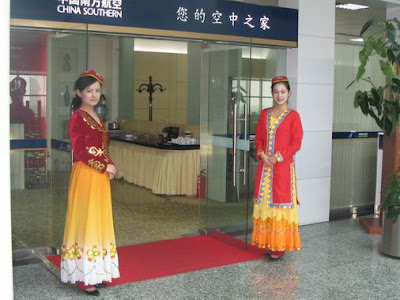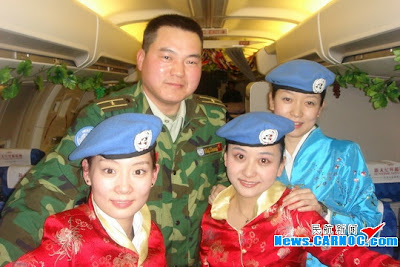You walk into the room
With your pencil in your hand
You see somebody naked
And you say, “Who is that man?”
You try so hard
But you don’t understand
Just what you’ll say
When you get home
Because something is happening here
But you don’t know what it is
Do you, Mister Jones?
– Ballad of a Thin Man, Bob Dylan
I lived in Xinjiang for three years. The yawning chasm between Uyghurs and Hans I saw on a daily basis in Xinjiang was disturbing, and I’m not even talking about divisions in economic opportunities or political power. I taught at a university in Urumqi, where large swaths of my Han students, though they ate Uyghur food and had lived there all their lives, didn’t know any of the dishes names in Uyghur. This struck me as being the equivalent of living in Southern California and not knowing the word “burrito”. On the eve of the Iraq war, administrators at another school told six of us, 3 Americans, 2 Australians and 1 Canadian, all Caucasian, not to leave campus after Bushs deadline, because “Uyghurs are Muslims, Iraq is Muslim”, and we would be targets of resentment and hostility. We laughed, because every Uyghur we knew hoped, not very secretly, for the US to liberate them from the Han*. Much later, at the university, I had beer with a colleague in the Foreign Languages Department. He asked if I was ever worried living amongst so many Muslims. The beer made me blunt “They don’t hate me. They hate you.” He was speechless. A Singaporean friend who was with us later said “You shouldn’t have said that. You’re right, but he can’t handle that and you know it.” I was frustrated, though. Vast numbers of Uyghurs would confess to any foreigner readily their worldview, which certainly didn’t match what Han Chinese believed. But between Uyghurs and Han, there was silence. As the Wall Street Journal reports, “One Uighur man working in Shanghai, when asked how Uighurs feel about government policy, said: “I can’t tell you the truth. It would be illegal.””
I’ve never been to Tibet, but I hear echoes of the same problems from Lhasa. I have no problem believing that Tibetans targeted violence at Han and Hui in Lhasa, for much the same reasons they are disliked in private by Uyghurs. In ESWN’s translation of a Han girls experiences How Can I Forget March 14, Lhasa?, the writer says the following:
I thought that I would be the same way with my Tibetan friends as before and not changed as a result of March 14. But as I sat in the Tibetan sweet tea house, I realized that everything has changed. The Tibetan service workers ignored the Han people completely and they only chatted with their Tibetan friends. Even worse, the Tibetans were swapping rumors and lies that completely distorted the facts. It was absurd that anyone can believe these bare-faced lies and regard them as the truth.
The reason why they believe that these were the facts is very simply that the tellers were Tibetans! They said, If you can’t trust a Tibetan, who can you trust? In any case, as long as it is a Tibetan, they you must help him no matter what the rights or wrongs of the matter are! Among their beliefs, there are no rights or wrongs and there is only ethnicity! There was no way for us to communicate!
The girl believes that what changed after March 14 were the Tibetans. I don’t think so. I think what changed is that she got a glimpse of what Tibetans have often said in private, and now dared to speak publicly. She says she “cannot forgive those criminals for destroying our homes, for destroying our lives, for destroying the brotherhood of Han and Tibetan, for destroying our trust…” I truly doubt that trust was there. Instead there was an uneasy peace maintained by silence. There was no communication of Tibetan grievances because they were suppressed.
Richard Spencer points out that much of this is because “those dependent on what the government has to say saw only soft-focus pictures of smiling folk dancers and peasants improving their lives through money funnelled from Beijing. That many Tibetans resented the Chinese would have seemed at best incomprehensible and at worst racist to an audience brought up on an ideologically correct vision of China’s ethnic minorities living in harmony.”
Shenzhen Fieldnotes had a timely post about the visit of teachers from Xishuangbanna, an ethnic enclave in Yunnan, to her elementary school. The minority teachers “arrived in “native” costumes which they wore the entire week. as far as i could tell, they weren’t wearing traditional clothing, but actual costumes that one would wear on stage to perform one of china’s 56 ethnic groups. these costumes included christmas garland and plastic flowers to adorn the women’s hair. Nevertheless, several of the han teachers told me that this is how ethnics dress, even when working in the fields. when i expressed sceptism, it was as if i had challenged something fundamental about being Chinese.”
She did challenge something fundamental about being Chinese. It’s in this context that academics say like this:
“The Communist Party has used nationalism as an ideology to keep China together,” said [Dibyesh] Anand, a reader in international relations at Westminster University in London. He said many Chinese regard the Tibetan protests “as an attack on their core identity.”
“It’s not only an attack on the state,” he said, “but an attack on what it means to be Chinese. Even if minorities don’t feel like part of China, they are part of China’s nationality.”
The Han official that accompanied them tells that he always urges them to maintain their traditions (with plastic flowers, apparently) in the face of modernization, which is curious since Han Chinese otherwise so often intensely pursue modernization otherwise, and look on less modern things with disdain. Academics such as Dru Gladney and Louisa Schein have written about how minorities in China have been commodified as exotic others, in the language of Edward Said, on which the Han can project their own modernity.
I just received a comment from a (presumably) Han Chinese person stating that Tibetans have received free medical, education and religous subsidies, and ends by saying “All Chinese People fully understand and support the policies of our government there; we should take care of Tibetan and their feelings.” Chris O’Brien at Beijing Newspeak had the perfect response to a Chinese media report arguing precisely the same thing, and which renders that final bit about Tibetans feelings incredibly ironic:
This commentary sums up perfectly the reasons why it will be a long, long time before the Chinese government gets the Tibetans on board. There is no attempt at understanding anything about what Tibetans are thinking. The argument is based purely on money and statistics. The door to discussions is closed.
I have yet to see any prominent Chinese media reports or rejoinders feature a Tibetan voice or representative, much less a Chinese Tibetan at the forefront of response to international media. But minorities in China have generally seemed to be seen and not heard.
It’s not simply the Chinese government doing this, however, but Han individuals as well. It’s not simply a top-down ideology impressed upon the masses, though the Party has certainly promulgated these sorts of ideas. The origins of this sort of thinking, where the Tibetans and others are lumped under the umbrella of “Chinese” without asking them for their honest opinion goes back before 1949. In 1927, while Tibet was essentially a de facto independent state, Sun Yat-sen discussed his Three Principles of the People, according to Frank Dikotter’s The Discourse of Race in Modern China, saying:
Considering the law of survival of ancient and modern races, if we want to save China and to preserve the Chinese race, we must certainly promote Nationalism. To make this principle luminous for China’s salvation, we must first understand it clearly. The Chinese race totals four hundred million people; of mingled races there are only a few million Mongolians, a million or so Manchus, a few million Tibetans, and over a million Mohammedan Turks. These alien races do not number altogether more than ten million, so that, for the most part, the Chinese people are of the Han or Chinese race with common blood, common language, common religion and common customs – a single, pure race.
Let’s dispense, for the moment, with the mental and semantic acrobatics that seem necessary to reconcile the words “alien”, “pure” and “mingled”. Let’s consider the fact that Sun Yat-sen was pushing a form of racial nationalism, Han nationalism, in order to “save China”. That the “alien races” are mentioned at all seems to imply that they didn’t get the privilege of pursuing their own racial nationalism. They were coming along for the ride to rescue China whether they liked it or not. And this narrative of the Chinese race faces the specter of extinction was not a new one, either. As I’ve previously written, it’s been around since the Qing Dynasty. From the late 19th century until now, it has always been a mix of racial nationalism (the resurgence of the once great Chinese, which too easily is thought of as Han), and the borders of the Qing Dynasty. The Tibetans and Uyghurs, rather sharing the sense of shame that Han Chinese have sometimes known as the “Century of Humilation” (1840-1949), in fact cherish that time as the one they wish to reclaim.
One can find the entanglement of minority and Han identity in the bestseller Wolf Totem, just released in English translation. The book centers on a young Han man who comes under the tutelage of an old Mongol herder when he’s rusticated to Inner Mongolia during the Cultural Revolution. The author Jiang Rong makes explicit analogies comparing nomads and Han to wolves and sheep, respectively, while also making the Han the bringers of thoughtless destruction via modernization. The ethnic minority, in this case the Mongols, are used as a contrast to comment on the inadequacies of the Han people. As Time Magazine’s Simon Elegant points out:
…its pleasant pastoral passages are sooner or later interrupted by jarring expositions that wouldn’t look out of place in a 19th century manual of eugenics. Here’s one from the novel’s main character, Chen Zhen:
“The way I see it, most advanced people today are the descendants of nomadic races. They drink milk, eat cheese and steak, weave clothing from wool, lay sod, raise dogs, fight bulls, race horses, and compete in athletics. They cherish freedom and popular elections, and they have respect for their women, all traditions and habits passed down by their nomadic ancestors.”
This sort of language is hardly out of place with Sun Yat-sen’s seventy five years before it, or Liang Qichao’s over a century ago.
It’s interesting to consider Wolf Totem’s condemnation of the Han as sheep when so many Han Chinese are saying themselves that the Han are still weak, weak-minded, and not capable of independent thought in response to criticism and media coverage of the Lhasa events. Clearly Jiang Rong has the pulse of the zeitgeist, and given the historical background I’ve just described, one can see how he may have gotten there.
But perhaps the most fascinating part of Wolf Totem, in this case, is what happens when Chen Zhen, obsessed with learning the secrets of the wolves, traps a cub. The Mongol community is angered at this transgression, and it also heralds the arrival of thousands of Han migrants who devastate the ecology in the name of modernization. By trapping the wolf, one really traps oneself.
———————————————
*I previously wrote about this incident, and the discrimination and ethnic tension in everyday life in Xinjiang for the Asia Sentinel.




